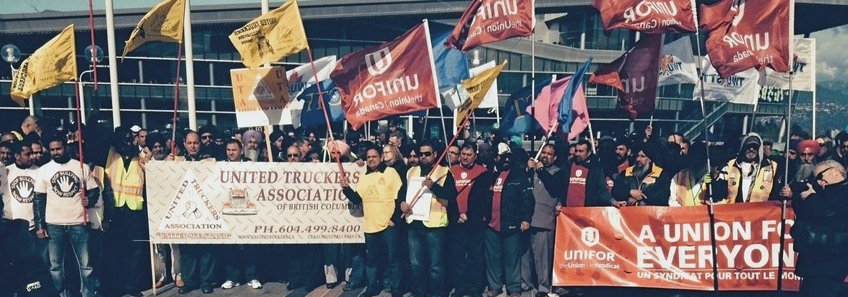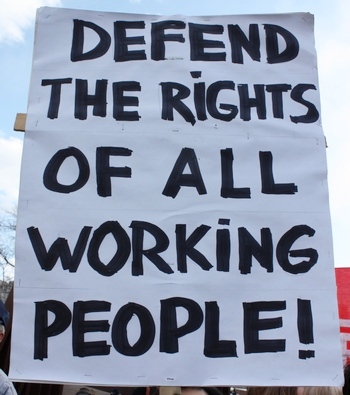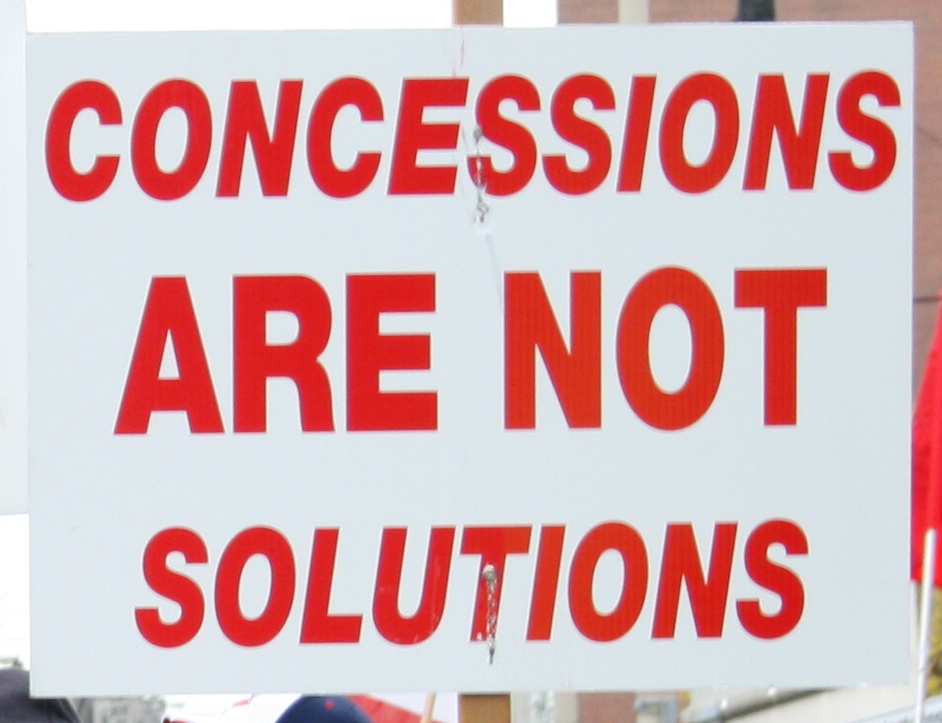|
April 20, 2017
Truckers Defend Their Rights
The Fight for Legal Recognition
- Normand Chouinard -
PDF

Truckers converge at Quebec National Assembly, November 19, 2016. (S. Thibault)
Truckers
Defend
Their
Rights
• The Fight for Legal Recognition -
Normand Chouinard
• Petition Tabled in Parliament
New Bid for Ownership
and Control of Algoma Steel
• Failures Underscore Necessity for New
Direction for the Economy - K.C. Adams
Truckers Defend Their Rights
The Fight for Legal Recognition
- Normand Chouinard -
Not a week goes by without actions to defend the rights
of truckers and to bring into being the legal recognition of the
trucking profession. Of particular note was the very successful rally
last November 19, when 600 trucks converged on the National
Assembly in Quebec City. This was a key moment in the fight of truckers
to
organize and mobilize themselves to affirm their rights. Truckers are
an important contingent of the working class in Quebec and Canada
fighting for their rights. Through their organizing and actions with
analysis they are determined to take their rightful place in the
economy and give it a new pro-social direction that upholds the rights
of all.
 One activity is the circulation of a
petition demanding that truckers be recognized as road professionals
whose work should have standards, acceptable to truckers, that are
applicable across Canada. They tabled their petition in the Canadian
Parliament on Friday April 7. The petition is an action of the
truckers themselves who have widely
circulated it to their peers across Canada. It represents an important
step on their part to reverse the damaging deregulation of the sector
governments have undertaken since the 1980s. Truckers seek to
improve their working conditions, which includes their safety and that
of the public. An aspect of this struggle is to reduce competition
amongst truckers so that the industry operates in a spirit of
cooperation. One activity is the circulation of a
petition demanding that truckers be recognized as road professionals
whose work should have standards, acceptable to truckers, that are
applicable across Canada. They tabled their petition in the Canadian
Parliament on Friday April 7. The petition is an action of the
truckers themselves who have widely
circulated it to their peers across Canada. It represents an important
step on their part to reverse the damaging deregulation of the sector
governments have undertaken since the 1980s. Truckers seek to
improve their working conditions, which includes their safety and that
of the public. An aspect of this struggle is to reduce competition
amongst truckers so that the industry operates in a spirit of
cooperation.
Truckers point out that their petition is addressed to
the Minister of Transport and they travelled to Ottawa to present it to
Parliament. The petition includes basic demands regarding the work in
the sector, which should be of great concern to any government. Despite
this, neither the Minister nor any representative of the Trudeau
government
had the decency to take part in the press conference held in Ottawa
when the petition was tabled. This was an unacceptable
attack on the dignity of truck drivers.
Organizing to Defend the Rights of Truckers

Rally, March 21, 2014, at Port of Vancouver, where 1,500 truck drivers
organized work stoppages
in fight for right to negotiate terms and conditions of work
acceptable to themselves.
Last December, the Canadian Transport Federation, a
not-for-profit organization, was established to ensure the presence of
truckers' representatives in various federal bodies dealing with
transportation issues. According to its website, the organization is
planning to work closely with the Association des routiers
professionnels du Québec, whose
primary mission is to have a place on the Government-Industry
Consultation Table in Quebec dealing with road safety for heavy
vehicles.
Another group of truckers concerned with issues in the
transportation sector is linked to a web radio channel called, "Heure
juste du
camionneur" (HJDC). This group recently established the National
Association of Canadian Truckers. According to the HJDC, this new
association differs from the Canadian Transport Federation in the sense
that its
immediate aim is to raise enough funds to legally defend truckers
accused of criminal negligence. Truckers generally are powerless on
their own when accused. Without money and organization, they have
difficulties in defending themselves. The purpose of this association
is to stop the criminalization of truckers when an incident occurs in
the
course of their work. The Association is planning to provide a service
including lawyers and lobbyists to defend any trucker who is charged.
The work of setting up national organizations has
become a necessity for thousands of independent brokers or contract
truckers who generally find themselves without real representation.
With this organizing work and actions, truckers are developing their
battle to defend their rights and dignity in their respective
workplaces and throughout all
regions.
 Truckers are determined to
change a situation where the conditions in their industry have greatly
deteriorated due to successive deregulation over the past 30 years
and the growth of companies with immense power. A profound imbalance
has developed in the working conditions of truckers, which they are
organizing to change. Every
day, truckers confront the power of the major manufacturing and
transport monopolies and a state machine that bows to every demand of
those who control the sector. Through organizing and actions with
analysis, truckers are fighting to defend themselves and their dignity
and establish a new equilibrium in relations of production that favours
them and defends their rights. Truckers are determined to
change a situation where the conditions in their industry have greatly
deteriorated due to successive deregulation over the past 30 years
and the growth of companies with immense power. A profound imbalance
has developed in the working conditions of truckers, which they are
organizing to change. Every
day, truckers confront the power of the major manufacturing and
transport monopolies and a state machine that bows to every demand of
those who control the sector. Through organizing and actions with
analysis, truckers are fighting to defend themselves and their dignity
and establish a new equilibrium in relations of production that favours
them and defends their rights.
Organization and unity of truckers across Quebec and
Canada are key to the development of the fight to ensure that the
movement of truckers for the affirmation of their right to decide the
direction of their industry continues and is successful. By building
their unity in action, the various groups will be able to measure the
strength they have
achieved in defending their rights and in transforming the situation in
their favour. Each step forward brings greater understanding of how to
wage the battle in defence of rights and greater unity amongst workers
in the industry and with their allies. The mobilization of all in this
work is necessary to create a strong momentum that develops
without letup.

Petition Tabled in Parliament

Truckers converge on Quebec City, November 19, 2016.
A petition demanding recognition of the trucking
profession was tabled in the House of Commons in Ottawa on
April 7. The petition is the initiative of truckers from Quebec,
Ontario, New Brunswick and Alberta. The petition has to date received
more than 6,000 signatures from Quebec, all provinces, the
Northwest Territories
and Yukon. In addition, 24 people from outside Canada signed the
petition.
The petition from truckers tabled in Parliament reads:
Petition to the Minister of
Transport
Whereas:
- there are many problems
associated with training, credentials recognition, safety and licences
for newcomers;
- working conditions are
unsuitable: base salary, overtime only after 60 hours, statutory
holiday calculations, unhealthy lifestyle, lack of job security and
health issues;
- the provincial ministers
have refused quasi-systematically to recognize military licences versus
civilian licences;
- selection programs and
training programs vary from one province to another, preventing wider
access (scholarships, grants);
- there is an increasing
shortage of drivers since professionals have left to seek better living
conditions, even if it means a pay cut;
- the trucking industry is
largely under federal jurisdiction, and enforcing provincial road
safety legislation and legally recognizing that this occupation is a
profession would help reverse this shortage;
- we provide a service that
is
essential to the Canadian economy;
- there is a chance the
American administration will overstep its bounds and tax cross-border
truckers;
We, the undersigned citizens
of Canada, call upon the House of Commons to recognize all truckers,
regardless of company or province, as road professionals.
We also call for standards
to apply from sea to sea, taking into account economic disparities, as
regards salary, protection from American taxation, benefits, health and
safety, and the quality of life for drivers and owner-operators.
 The petition was sponsored
and tabled in Parliament by the NDP MP Ruth Ellen Brosseau representing
the Berthier-Maskinonge riding. In a press conference, MP Brosseau
said, "[the trucking industry] is crucial to our regions, our economy
and especially to the people who have a job that's closely or
indirectly related to this industry.
Truckers are facing significant provincial disparities in benefits,
wages, and health and safety conditions. This sector is vital to the
Canadian economy." The petition was sponsored
and tabled in Parliament by the NDP MP Ruth Ellen Brosseau representing
the Berthier-Maskinonge riding. In a press conference, MP Brosseau
said, "[the trucking industry] is crucial to our regions, our economy
and especially to the people who have a job that's closely or
indirectly related to this industry.
Truckers are facing significant provincial disparities in benefits,
wages, and health and safety conditions. This sector is vital to the
Canadian economy."
Suzan Sidwell, a former truck driver and the petition's
first initiator said, "The truckers' grumbling against working
conditions and the disparity of standards has been felt for several
years. With this petition a clear message is sent to the federal
government, that they must take the leadership role to ensure that the
trucking profession is properly
recognized."
Daniel Beaulieu, a driver with more than 30 years
of experience and a facilitator of the Facebook page "L'Heure juste du
camionneur" (LHJDC) was the last to speak at the press conference
saying, "For nearly 40 years following deregulation, gaps have
been sneakily introduced into the conditions of truckers. I have noted
that
in 2017, a feeling of loneliness and of not being heard settled in
with each trucker.... Last November 19 [the large gathering of
truckers at the National Assembly in Quebec -- WF note], it was not
the industry that stood up but those who keep it going in spite of all
odds. On November 19, we proved to the rest of
Canada that it was time for us to unite, to build a common front and
move forward.... Today's petition for the recognition of the profession
is a continuation of this action."
No representative from the federal Ministry of
Transport or the Liberal government attended the event despite the
importance of the problems that were raised by the truckers.

New Bid for Ownership and Control of
Algoma Steel
Failures Underscore Necessity for
New Direction for the Economy
- K.C. Adams -

A group calling itself "certain secured creditors of
Essar Steel Algoma Inc." has launched a website to promote its bid to
gain ownership and control of Algoma Steel in Sault Ste. Marie,
Ontario. The group does not identify who the "certain secured
creditors" may be. The two main creditors of Essar Steel Algoma
claiming to be secure are
the U.S.-based Social Wealth Controlling Funds (SWCFs) Golden
Tree and Bain Capital. Those two SWCFs plus Deutsche Bank headquartered
in Germany, the main Debtor-In-Possession of Algoma's Companies'
Creditors Arrangement Act (CCAA) bankruptcy process, appear to have
gained control of this particular bankruptcy.
However, they are being challenged by another U.S. based SWCF/oligopoly
calling itself in Canada, Maga Steel Corporation.[1]
The website of "certain secured creditors" of Essar
Steel Algoma argues "the need for change at Algoma" and presents a
"restructuring plan." Workers can immediately identify a problem with
the plan outlined in the website: it isolates Algoma Steel from the
Canadian steel sector and broader economy and directs its fire
internally at the
Algoma Steel active and retired workforce, demanding concessions.
The plan presents Algoma Steel in isolation from other
parts of the steel sector and its place and role within Sault Ste.
Marie's interrelated economy and more broadly in the Canadian economy.
By presenting problems at Algoma Steel in isolation from the overall
socialized economy and demanding concessions from the workforce, the
plan
ignores the underlying problems in the sector and economy that need to
change if any plan for a particular part of the economy is to be
successful.
 This is the fourth time
Algoma Steel has been under CCAA and the second time the Stelco steel
producer in Southern Ontario has been in bankruptcy protection. These
failures underscore the necessity for a new direction for the economy
where Canadians can exercise control over their own economic affairs
and solve the problems as they
pose themselves, instead of pretending one part is not connected with
the whole and that concessions from the workforce are a solution. This is the fourth time
Algoma Steel has been under CCAA and the second time the Stelco steel
producer in Southern Ontario has been in bankruptcy protection. These
failures underscore the necessity for a new direction for the economy
where Canadians can exercise control over their own economic affairs
and solve the problems as they
pose themselves, instead of pretending one part is not connected with
the whole and that concessions from the workforce are a solution.
The various parts of the steel sector, if they are
going to solve their particular problems, require as a priority changes
to the overall economy and scientific planning of Canadian steel
production in all regions to meet the apparent steel demand of an
independent Canadian economy without interference from outside the
economy. These changes
must include measures to ensure the market price of steel reflects its
price of production here in the Canadian economy and not a price the
oligarchs dictate in the U.S. or elsewhere in their imperialist system
of states.
The website of "certain secured creditors" alludes to
the problems of the steel sector but, instead of proposing a new
direction, reduces the issue to one of stealing the claims of the
working class on the value it produces and taking that social wealth
out of the local and Canadian economy for the benefit and use of
"certain secured creditors"
from the United States. The website highlights the volatility of the
price of steel but instead of offering solutions diverts from the issue
to an attack on the claims of steelworkers and retirees and on rival
producers within the imperialist system of states.
The group says, "As we have seen over the past 18
months, the price of steel is highly volatile (HRC has ranged from
U.S.$354 to U.S.$653 per ton). However, it cannot be assumed that the
current high price of steel will continue over the long-term."
Instead of proposing ways to control the volatility of
the prices of steel and raw material inputs within a Canadian economy
under sovereign control, the website turns its ire on current and
retired workers saying: "Algoma's current defined benefit pension plan
situation is unsustainable. Algoma's ongoing labour costs are
significantly higher
than those of its competitors."
Lowering the claims of workers, retirees and society on
the steel value workers produce and shifting that value to "certain
secured creditors" is not a solution. It does nothing to solve the root
problems in the steel sector and economy. Rather than tackling the
problem of finding a new stable and secure direction for the Canadian
steel sector and
economy without recurring crises, the website uses the problems in the
steel sector as an excuse to attack those who produce the steel value
and to demand they lower their standard of living while working and in
retirement.
To increase their claim on the value Canadian workers
produce, the "certain secured creditors" from the U.S. also want relief
from environmental and other regulations and a lowering of the claims
of the state on steel value. Shifting around the claims of the value
Algoma Steel workers produce away from themselves and the Canadian
state to
the SWCF owners does not sort out the problems in the steel sector. The
refusal to chart a new direction is the main reason why Algoma Steel
and Stelco are permanently in crisis mode.
The website writes, "We need to create an Algoma that
is sustainable and profitable for the long-term and able to withstand
the cyclical nature of the global steel market." They do not realize
how irrational and idiotic they are when they use the words
"sustainable" and "cyclical" in the same sentence. They refuse to
acknowledge that the
"global steel market" is a big part of the problem.
 The website continues, "The
community of Sault Ste. Marie, Algoma's employees and the steel
industry are well aware of Algoma's three prior restructurings,
including one under employee ownership. None of these restructurings
have resulted in a sustainable business. 'Kicking the can' has been
ineffective in the past and is not a viable
solution now." The website continues, "The
community of Sault Ste. Marie, Algoma's employees and the steel
industry are well aware of Algoma's three prior restructurings,
including one under employee ownership. None of these restructurings
have resulted in a sustainable business. 'Kicking the can' has been
ineffective in the past and is not a viable
solution now."
A partial description of a situation without analyzing
the root is woefully incomplete and self-serving. This refusal to
analyze degenerates into an anti-worker "kicking the can down the road"
attack on the Algoma steelworkers who have steadfastly defended their
right to defined-benefit pensions and Canadian standard wages and
affirm that
concessions are not solutions.
The website does not analyze or discuss the root
problem in the economy, which stems from the lack of control by
Canadians over the steel sector and the overall contradiction between a
completely socialized production process within an interrelated economy
clashing with the private control of competing parts of that socialized
economy.
Control over the steel sector and economy is exercised by
privately-controlled SWCF/oligopolies mostly located in the United
States. They compete to defend and expand their private social wealth
and empires without consideration for the development of the whole and
the necessary connections amongst its parts, leading to recurring and
increasingly severe crises.
The "certain secured creditors" are not interested in a
viable sustainable steel business in Canada. They are interested in
building their private empires and retaining control over the parts of
the socialized economy they own, in contradiction with the working
class
and in competition with the parts of the economy they do not control.
They are
not interested in having the socialized forces of production brought
under the control of the actual producers in a spirit of cooperation
amongst all the parts of the economy within a defined territory called
Canada. They refuse the challenge of the times to bring the various
socialized parts of the Canadian economy into harmony with one another
to
ensure stability and security by being outside the domination of the
crisis-ridden and warmongering U.S.-led imperialist system of states.
The current crisis-ridden direction of the economy and control of the
oligarchs over the Canadian and U.S. states are the conditions the
oligopolies demand for empire building. Canada needs a new direction!
The oligarchs need steelworkers to produce the value
they covet, raw material, socialized forces of production and a market
for production. This puts the "certain secured creditors" and other
oligarchs in a social relation with the working class they require to
expand their social wealth and within a complex modern interrelated
economy. The
oligarchs exercise control over particular parts of the economy, which
in this case includes Algoma Steel. They use this power and the power
of the state they control to exercise a dictatorship within the social
relation with steelworkers and salaried employees.
At this time, the oligarchs are not interested in
having equilibrium with the working class within the social relation
imposing instead an unrelenting anti-social offensive for decades. The
disequilibrium within the social relation contributes to the recurring
crises of the socialized economy under their private control. Within
this chaotic atmosphere and
pressure of crises and war, the oligarchs increasingly use the police
powers of the state, such as the CCAA, to have their way. Using their
great social wealth and police powers of the state they strive to
dictate their will within the social relation with the working class
and deny workers their rights. This retrogressive activity of the
oligarchs makes
the situation worse for the economy and working people.
Concessions Are Not Solutions! No Means No!
The actual producers of steel value, steelworkers and
salaried employees, need to claim some of the value they produce for
their own reproduction and survival until they pass away. Other claims
on steel value are needed to meet the general interests of society. How
large should those claims be? Who decides the size of the claims? The
"certain secured creditors" want to dictate what the working class
claims according to their own narrow private use for empire building,
not just at Algoma Steel in Sault Ste. Marie but throughout their
sprawling global empire. To this end, their website contends that
owners and investors in steel production are suffering downward
pressure on their
rate of profit and rate of return on their investment and need relief
through a greater claim on the value workers produce. Otherwise, they
will not invest and may even dismember the facility and sell it off
piecemeal.
 They write, "Algoma must
become a more efficient manufacturer with a more flexible cost
structure. Massive expansion of steelmaking capacity in countries like
China and Brazil (with low labour costs and lax environmental
standards) have made Algoma uncompetitive. In North America, there has
been a significant increase in production by
mini-mills that have lower costs due to more flexible cost structures,
more modern steelmaking facilities and locations closer to their
customers. They write, "Algoma must
become a more efficient manufacturer with a more flexible cost
structure. Massive expansion of steelmaking capacity in countries like
China and Brazil (with low labour costs and lax environmental
standards) have made Algoma uncompetitive. In North America, there has
been a significant increase in production by
mini-mills that have lower costs due to more flexible cost structures,
more modern steelmaking facilities and locations closer to their
customers.
"Algoma's cost structure is significantly higher than
its North American competitors because: Algoma remains one of the last
single-plant companies in North America and is competing with larger,
multi-plant companies. Algoma's current defined benefit pension plan
situation is unsustainable. Algoma's ongoing labour costs are
significantly
higher than those of its competitors."
One wonders why they would even bother making a bid
given their extremely negative view of Algoma Steel and the steel
sector generally. The clue is in their plan to go after workers' wages,
benefits and pensions. The website declares wages and pensions a
"labour cost," presumably a cost to the investors. Yet, the working
class produces
the value it claims as wages and pensions. To present the claims of the
working class as a cost to the investors is self-serving in the
extreme. Such a retrogressive view against the actual producers of
value does not lead to finding solutions to economic problems in a
modern economy.
The working class produces all the value within a
socialized economy. The division of that value amongst the claimants
requires a calm atmosphere and arrangements agreeable to workers within
the social relation, not dictate on the part of investors and
ridiculous
accusations that workers and their claims are a cost of production.
Within the
current social relation, the produced value has to be divided up
amongst the claimants in a spirit of equilibrium not dictate.
The "certain secured creditors" are proposing to make
Canada even more captive within the imperialist system of states and
incapable of running its own affairs. They are proposing a lower
standard of living for Canadian workers and austerity for the society
generally so that the oligarchs can stuff their pockets and build their
private empires,
compete with their global rivals and wage predatory wars. To fulfill
their aim of empire building, they seek to destroy any notion of an
independent Canadian economy and nation-building, and smash any
conception of a Canadian standard of living and a society that cares
for its members.
 They threaten Canadians
saying any investments in the mill will only come "if Algoma has a
competitive cost structure." This cost structure is dictated by them on
their terms according to their aim for private profit and their outlook
of empire building in contradiction with the Canadian working class and
in competition with other oligarchs
within the imperialist system of states. Their imperialist aim and
outlook are incompatible with the aim and outlook of Canadians for
their own independent economy and a nation that they control and direct
to serve the well-being of the actual producers and the general
interests of Canadian society. An independent economy and state that
serves
the interests of its own people can and must organize norms,
expectations, rules and laws on how to decide the size of the claims of
all claimants on the value workers produce. Such a Canada cannot allow
dictate on the part of foreign or other investors to decide the size
and distribution of claims. That is a recipe for disaster,
disequilibrium and
recurring crises. They threaten Canadians
saying any investments in the mill will only come "if Algoma has a
competitive cost structure." This cost structure is dictated by them on
their terms according to their aim for private profit and their outlook
of empire building in contradiction with the Canadian working class and
in competition with other oligarchs
within the imperialist system of states. Their imperialist aim and
outlook are incompatible with the aim and outlook of Canadians for
their own independent economy and a nation that they control and direct
to serve the well-being of the actual producers and the general
interests of Canadian society. An independent economy and state that
serves
the interests of its own people can and must organize norms,
expectations, rules and laws on how to decide the size of the claims of
all claimants on the value workers produce. Such a Canada cannot allow
dictate on the part of foreign or other investors to decide the size
and distribution of claims. That is a recipe for disaster,
disequilibrium and
recurring crises.
The website of "certain secured creditors" at Algoma
does not speak of equilibrium within the social relation with those
Canadians who produce steel value. Far from it and that is a big
problem. The website demands disequilibrium and no right of the actual
producers to decide their claims and no right of Canadians to decide
and control the
direction of their economy and how much value society needs for its
general interests.
The "certain secured creditors" want to use Canadian
workers to produce value for them and use Canada's resources and
territory for their empire building. They make it clear that they do
not want any interference of Canadians in their empire building even
though this is Canada and not theirs. They do not want Canadians
affirming their
rights and exercising control over their own lives, economy and
society, which begins with control over their economy in a defined
territory under a government of laws. The opposition of the oligarchs
to the right of Canadians to their own economy and society under their
control is a big problem Canadians must solve.
Who controls the economy and for what aim? The
empire-builders want complete control without any equilibrium with
Canadians. They refuse to allow Canadians any control over their
economy and lives. Canadian steelworkers and their allies are
confronting this problem in the steel sector and are determined to find
a solution that favours
themselves, the Canadian economy and society and opens a path in a new
pro-social direction. A step in this direction is the determination of
active and retired steelworkers at Algoma Steel and Stelco to defend
what is theirs by right from the assault of the oligarchs. On their
banners are written:
Hands Off Our Pensions, Wages and
Benefits! No Means No!
Keep Stelco
and Algoma Steel Producing!
Note
1. A Social Wealth Controlling Fund (SWCF) acts
in the fashion of an oligopoly. The social wealth it controls spreads
like tentacles throughout the socialized economies of the imperialist
system of states. The SWCF/oligopolies control large swathes of sectors
from top to bottom, and control the ways
their associated companies interact with one another in the sector and
beyond into other sectors throughout the imperialist system of states.
They also exercise direct control over the state and its institutions
such as the police powers of the CCAA in Canada and Chapter 11 in
the U.S.
The enormous size of their holdings of social wealth
and state-organized control allows the SWCF/oligopolies to manipulate
economies to their particular advantage to generate big scores, even
deliberately creating crises when it serves their narrow interests.
Their actions include robbing workers' pensions and savings and
expanding their
empires through seizure of raw material, regions and companies through
bankruptcies, schemes for big scores, predatory wars, regime change and
crises that are either well planned and executed with military
precision or occur suddenly without warning.
The U.S.-based Bedrock SWCF/oligopoly is attempting to
take control of Stelco and rob its pensioners of their benefits and
savings and deny responsibility for environmental remediation. There
appears to be collusion if not outright cooperation amongst those in
control of Bedrock, U.S. Steel, its Canadian subsidiary again known as
Stelco, the
Ontario Superior court and the police powers of the CCAA, and the
federal and Ontario governments.
Another U.S.-based SWCF/oligopoly headed by Thomas M.
Clarke from West Virginia has announced a rival bid to take ownership
and control of Essar Steel Algoma while under CCAA in opposition to the
bid of Golden Tree, Bain Capital and Deutsche Bank. Clarke's
SWCF/oligopoly goes under numerous names including Maga Steel
Corporation, Kissito Healthcare International, Southern Coal Corp., and
ERP Compliant Fuels. The Clarke SWCF/oligopoly has recently acquired
Oak Grove Mine in Alabama and Pinnacle Mine in West Virginia from the
infamous Cliffs Natural Resources, and seized the Maple Mine in West
Virginia and an associated coke plant in Alabama while
they were under Chapter 11 bankruptcy. Its numerous holdings
include three mines in BC producing metallurgical coal used in steel
production, and ownership of a 13,500 acre forest in Belize and
control over an area along the Mississippi River flood plain both used
for "carbon offsets" to allow its coal companies to produce without
legal or other concerns for environmental problems or penalties. The
Clarke SWCF/oligopoly also leads the Virginia Conservation Legacy Fund
with control over more than 30,000 acres of land in that state,
while at the same time being a large coal producer in the region that
will benefit from President Trump's loosened environmental
regulations on the coal sector.

PREVIOUS
ISSUES | HOME
Website: www.cpcml.ca
Email: office@cpcml.ca
|

